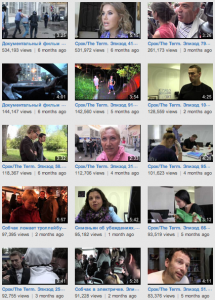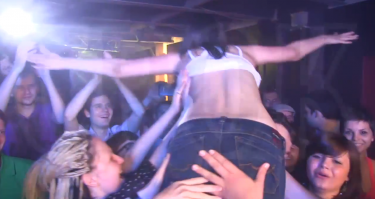This past week, on December 12, filmmakers halted the online publication of one of Russia's most curious documentary efforts: “Srok” (“The Term”), a video project hosted on YouTube [ru] and LiveJournal [ru], chronicling and capturing the events of the opposition movement. That synopsis, incidentally, fails to capture what Srok actually is, according to the creators’ own words [ru]:
Мы не ведем летопись протестов, не делаем репортаж о происходящем. Мы фиксируем мысли и эмоции лидеров. Мы хотим понять куда они ведут нас. К чему зовут. Даже тогда, когда им самим грозит срок.
We're neither chronicling the protests nor reporting on events. We're recording the thoughts and emotions of [the movement's] leaders. We want to understand where they're leading us. To what are they calling us? [And why do they do it,] even when a prison sentence [srok] threatens them [for doing so]?
What is Srok?
The documentary's title is intentionally ambiguous. Whose term? The term of what? As mentioned above, there is a supposed “prison sentence” (srok) threatening oppositionists. Also in their inaugural LiveJournal post, however, Srok's authors declare:
В мае 2012 года начался новый президентский срок Владимира Путина. За полгода до этого истек срок путинской стабильности.
In May 2012, Vladimir Putin began a new presidential term [srok]. Six months earlier, the Putin Stability era [srok] came to an end.
Viewers are at liberty to define “srok” as they wish, and this vagueness has not been lost on the public. Indeed, LJ users were quick to ask [ru] Srok's creators to explain the project's name. The response was unsurprisingly coy:
Смыслов много. История покажет, какой из них окажется доминирующим.
[The word has] many meanings. History will reveal which of them will be dominant.
Since first appearing on YouTube, Srok has released 271 videos and privately archived over a thousand other “episodes,” all of which will be incorporated into a final feature-length documentary film. In this sense, Srok is hybrid between an online political-art project and a viral publicity campaign. Posting random “episodes” to YouTube has both artistic and promotional merit.
On rare occasions, oppositionists have waved off Srok's cameramen. According [ru] to project member Konstantin Atomaniuk, leftist activist Sergei Udaltsov once told him to go away, saying, “No, no, no. I have my own plans.” Environmentalist Evgeniia Chirikova did the same, it seems.
That said, Srok has enjoyed excellent access to the protest movement's leaders. In the videos available publicly on YouTube, Alexey Navalny appears in over 20 clips, Chirikova is featured nearly a dozen times, Udaltsov at least ten, and a host of other usual suspects regularly grace the screen. The situations are often intimate. We join [ru] Chirikova at home with her family reading books. We follow [ru] Nadezhda Tolokonnikova's four-year-old daughter to the United States, where she meets Yoko Ono and waits bored in a hotel room for her father. We attend [ru] a loud and drunken party with the Navalnys, Ilya Yashin, Oleg Kashin, Tikhon Dziadko, and a cluster of other Moscow intelligentsia. There is even table-dancing and rhythmic chanting against Putin!
Srok has also taken [ru] viewers into the office of Margarita Simonyan (chief editor of the English-language, government-funded RT television network) and to the dacha [ru] of Vasily Yakemenko (the creator the pro-government NASHI movement). Oleg Kashin called [ru] these interviews “either a creative experiment or a compromise with Alexey Gromov,” suggesting that Srok's directors might have been caving to government pressure, when they extended their focus beyond the protest movement to Simonyan and Yakemenko. (Indeed, Srok cameramen—rather incomprehensibly, given the project's purpose—even shadowed [ru] then-Moscow Governor Sergei Shoigu in October 2012.)
The Police Search Kostomarov's Home
Srok is a collaboration between two documentary filmmakers and one journalist: Pavel Kostomarov, Aleksandr Rastorguev, and Alexey Pivovarov. On December 7, in connection with the case against rioting at Bolotnaia Square in May 2012, federal investigators arrived at Kostomarov's Moscow apartment early in the morning and searched his video archives. (Srok's first upload [ru] to YouTube—a clip of Alexey Navalny being arrested violently on May 6 before he could take the stage at a protest—now has over a half a million views.) Later, police called in Kostomarov for questioning as a witness to the May unrest. Immediately following his visit with investigators, he announced [ru] the indefinite suspension of the Srok project. In comments to publicpost.ru, Rastorguev clarified that filming will continue unabated, but no new footage is scheduled to appear online.
Pivovarov, an accomplished NTV news anchor, endeared himself to many oppositionists last winter, when he reportedly refused to appear on air [ru], unless he was permitted to mention in his telecast the mass protest at Bolotnaia Square on December 10, 2011. Last week, nearly a year later, he got another chance to speak truth to power, when he [ru] asked [en] Prime Minister Dmitri Medvedev on live television to comment on the investigators’ search of Kostomarov's home:
Но как нам, журналистам […], как нам работать, Дмитрий Анатольевич, если к нам в 7 утра приходят с обыском? Конечно, каждого из нас можно привлечь в качестве свидетеля – не вопрос. Можно стребовать видеоматериалы. Но в 7 утра прийти с обыском – понимаете, это сигнал. Как работать?
But how are we journalists supposed to work […], how are we supposed to work if they come to search our homes at 7am? Of course, they can bring in anyone of us as a witness, no problem there. They can subpoena video materials. But coming with a search at 7am, that sends a signal. How can we work?
At first, Medvedev dodged the question, saying that Kostomarov had yet to submit an official complaint about the search, implying that no scandal existed. When pressed on the subject, the Prime Minister resorted to a 1990s comparison, expressing relief that times now are not as “tough” as during the masked police raids of the Yeltsin era. Finally, in offscreen comments [ru] after the interview (captured by RT cameras and accidentally published online [ru]), Medvedev told Pivovarov “not to worry” and called the investigators “assholes” (“kozly”).

Just some of the videos available from Srok. (Screenshot from Srok's YouTube page.) 15 December 2012.
Kostomarov, for his part, says that the search was conducted respectfully. Speaking to journalists outside the Investigative Committee's headquarters, he explained [ru] that “everything generally was not like it was for [Ksenia] Sobchak” (referring to when police searched her apartment in June, forcing her to remain in her bathrobe during the procedure).
Reactions to Kostomarov & the “End” of Srok
In the aftermath of the apartment search and the suspension of all new Srok videos, RuNet users have responded with a mix of despondency and anger.
“Once again, the winter begins hot-tempered,” LJ user hudson_bay complained on December 7, adding [ru]:
Я не могу поверить, что это происходит в моей жизни, а не какой-то сюжет НТВ. Близкие люди мне рассказывают, кто у них сидит из друзей под домашним арестом, кто – в изоляторе.
I can't believe that this is happening in my life, and not in some [fictional] plot on NTV. People close to me are saying that some of their friends are under house arrest and others are in solitary confinement.
Writer Aleksandr Arkhangelsky wrote [ru] on LiveJournal:
[…] следаки из следокома посылают явный сигнал журналистам: не фиксируйте. Но и в том, что брошен вызов всей корпорации репортеров и документалистов; плоские мозги принимавших решение просто не в состоянии вместить, что они отрезали путь к отступлению целому классу деятельных людей, умеющих рассказывать об окружающей реальности,и даже самые сговорчивые обречены вступить в зону протеста и продемонстрировать презрение к следственному комитету.
[…] these probers from the Investigative Committee are sending a clear message to journalists: don't record. But this challenges the entire body of reporters and documentarists. Flatheads have made a decision that is simply too big to fit in their narrow skulls. They've cut off an escape route for a whole class of active people capable of describing the surrounding world, and [now] even the most incurably appeasable will join the protests and demonstrate their contempt for the Investigative Committee.
In a Facebook comment “liked” by Rustem Adagamov, Yuri Saprykin, and others, journalist Roman Super revisited [ru] the specter of Stalinist repression:
Несколько месяцев назад Александр Уржанов тревожно писал и говорил, что дальше начнут приходить к журналистам, писателям, режиссёрам. Что за бред? Ну правда ведь, шизовато проводить параллели с тридцатыми годамы в конце 2012-го. Чёрт, получается, что не так уж и шизовато?
A few months ago, Aleksandr Urzhanov alarmingly wrote and said that next they'll come for the journalists, the writers, and the directors. What raving! I mean, it's madness to compare the end of 2012 with the 1930s. But, hell, it turns out that it's not madness, after all?
Srok's creators have promised in the coming weeks to clarify the project's future. Whatever they decide in light of Kostomarov's situation (which has transformed him into a subject of his own movie), Srok represents a fascinating blend of documentary filmmaking and Web 2.0 distribution. The film series ranges from on-the-ground, in-the-trenches protest footage to office-room conversations and countryside strolls in the mud. Often, Srok is about Navalny and the leaders of the organized opposition. Other times, though, it's about bloggers freeing migrant-worker slaves [ru] or elderly racists in the street screaming slurs [ru] at dark-skinned passersby.
The Srok series is an amalgam of public life in Russia, and it makes no apologies for its cumulative incoherence. Whether you're crowd-surfing above the Moscow clique or picking flowers with pro-Kremlin ideologists, watching Srok is an entertaining trip and a remarkable look at contemporary Russian political culture.








